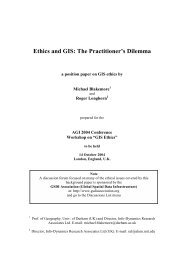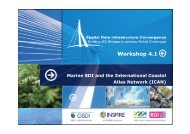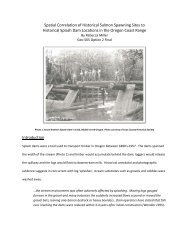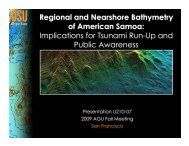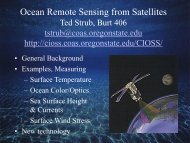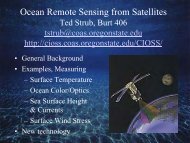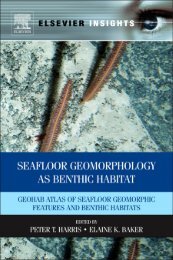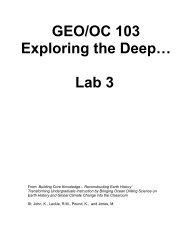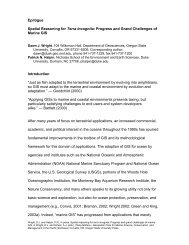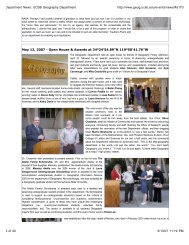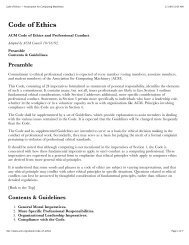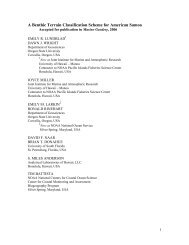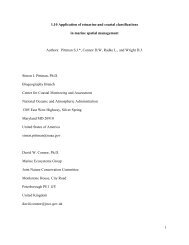GEO/OC 103 Exploring the Deep… Lab 7 - Dawn Wright
GEO/OC 103 Exploring the Deep… Lab 7 - Dawn Wright
GEO/OC 103 Exploring the Deep… Lab 7 - Dawn Wright
Create successful ePaper yourself
Turn your PDF publications into a flip-book with our unique Google optimized e-Paper software.
<strong>Exploring</strong> <strong>the</strong> Ocean Environment<br />
Unit 4 – Marine Productivity<br />
Converting to trillions<br />
Move <strong>the</strong> decimal point 12 places to <strong>the</strong> left,<br />
<strong>the</strong>n round to <strong>the</strong> appropriate decimal place.<br />
Example:<br />
27656585301787.3<br />
= 27.7 trillion<br />
Calculating average productivity<br />
To calculate average productivity, divide <strong>the</strong><br />
Total Productivity by <strong>the</strong> Total Area. Be sure to<br />
write both measurements in trillions, so <strong>the</strong><br />
trillions will cancel each o<strong>the</strong>r.<br />
Example:<br />
Total Productivity<br />
27.7 trillion kgC<br />
=<br />
Total Area<br />
211.0 trillion m 2<br />
= 0.13 kgC/m 2<br />
Turn on and expand <strong>the</strong> Coastal<br />
Productivity layer.<br />
Click <strong>the</strong> Summarize button .<br />
In <strong>the</strong> Summarize window, select<br />
Coastal Productivity as <strong>the</strong> feature<br />
layer.<br />
Select Distance as <strong>the</strong> field to<br />
summarize in <strong>the</strong> drop-down menu.<br />
Double-click Area (m^2) to display<br />
<strong>the</strong> statistics options, check Sum.<br />
Next, double-click Total<br />
Productivity (kgC) to display <strong>the</strong><br />
statistics options, check Sum, and<br />
click OK. (Be patient — summary<br />
tables may take a while to process.)<br />
In <strong>the</strong> resulting summary table, <strong>the</strong> Sum TOTAL_Prod field gives <strong>the</strong> total<br />
productivity, and <strong>the</strong> Sum_PROJECTED field gives <strong>the</strong> total area, for each<br />
coastal zone. These values are very large, in <strong>the</strong> trillions. One trillion is <strong>the</strong> word<br />
for <strong>the</strong> number value 1,000,000,000,000.<br />
6. Record <strong>the</strong> total productivity and total area for each coastal zone in Table<br />
1. Round productivity and area to <strong>the</strong> nearest 0.1 trillion. (See sidebar for<br />
help with converting values to trillions.)<br />
Table 1 — Marine productivity with distance from coastline<br />
Coastal zone<br />
Total productivity<br />
trillion kgC<br />
Total area<br />
trillion m 2<br />
Average productivity<br />
kgC/ m 2<br />
Open Ocean (> 960 km) 27.7 211.0 0.13<br />
Far (640 – 960 km) 5.9 37.7 0.16<br />
Mid (320 – 640 km) 7.5 43.4 0.17<br />
Near (0 – 320 km) 24.3 72.5 0.34<br />
7. Calculate <strong>the</strong> average marine productivity for each zone and record your<br />
results in Table 1. Round to <strong>the</strong> nearest 0.01 kgC/m 2 . (See sidebar for help<br />
calculating average productivity.)<br />
8. What happens to <strong>the</strong> level of marine productivity as <strong>the</strong> distance seaward<br />
from <strong>the</strong> coastline increases<br />
Productivity decreases with distance seaward from <strong>the</strong> coast.<br />
9. Of <strong>the</strong> resources necessary for photosyn<strong>the</strong>sis (water, sunlight, carbon<br />
dioxide, and nutrients), which do you think is most likely to change with<br />
distance from <strong>the</strong> coast to produce <strong>the</strong> pattern you observe in Table 1<br />
Explain your answer.<br />
Water, sunlight, and carbon dioxide are not going to change dramatically with distance<br />
from <strong>the</strong> shore, so nutrient levels must decrease with distance from <strong>the</strong> coast.<br />
Close <strong>the</strong> Summary Table window.<br />
The life-giving ocean 131



